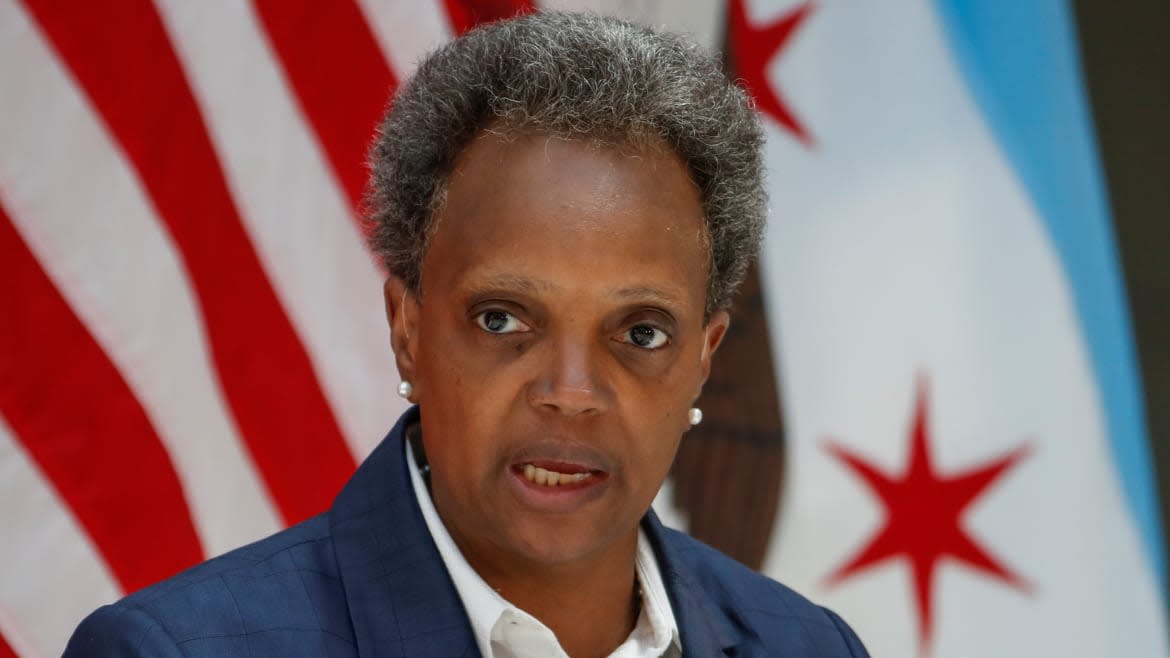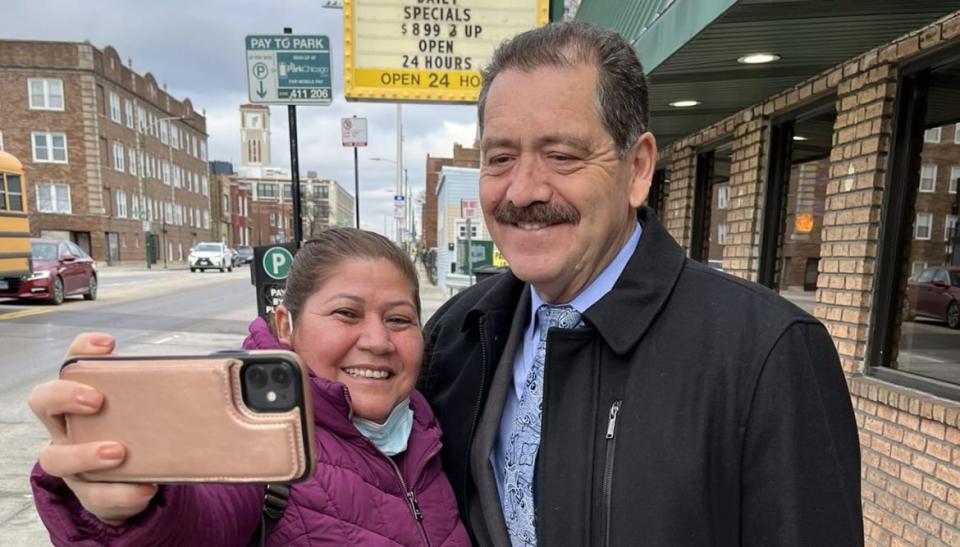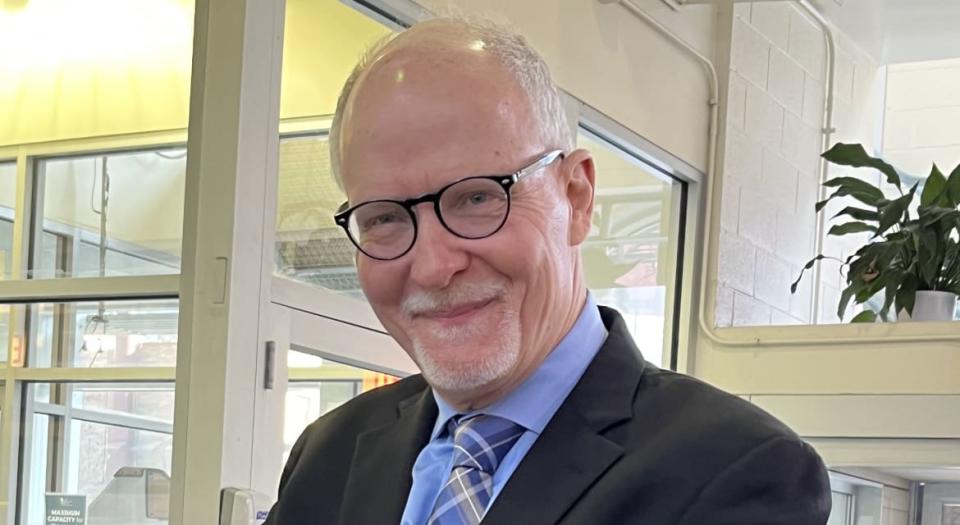Chicago Voters Show Lori Lightfoot the Door After Nasty Mayoral Race

Chicago’s mayoral race, a bitter campaign rife with controversy and blunders, from gnome insults to accusations of fake Democrats, ended Tuesday with no candidate winning a majority of the vote, placing Paul Vallas and Brandon Johnson in a runoff to be settled in April.
Incumbent Mayor Lori Lightfoot conceded defeat in the race on Tuesday night as it became increasingly clear that voters had rejected her bid for a second term in office. “I stand here with my head held high,” she said in her concession speech.
“Serving as your mayor has been the honor of a lifetime, and I am so grateful to all of you who have stood beside me these last four years,” she later posted on Twitter.
“We’ve made significant progress building a safer, more equitable city. I thank each and every one of you for believing in me.”
A runoff was expected, with pundits in the Windy City predicting that more than half of the nine candidates—all self-described Democrats in a nonpartisan race—had a chance of being among the top two to qualify for the runoff, but none could realistically carry more than 50 percent of the vote on Tuesday.
Lightfoot won just over 16 percent of the vote to lose her spot on April’s ballot—something that emerged as a possibility in the buildup to election day. Multiple polls from February had Lightfoot, the first Black woman and first openly LGBTQ person to be Chicago’s mayor, hovering around just 18 percent of the vote.
The tight race, which centered around crime and the perception of it in the city, pulled out a series of embarrassing blunders by frontrunners.
#BREAKING: Chicago Mayor Lori Lightfoot loses Democratic primary, and will not serve a second term. pic.twitter.com/FhKXAq5dxU
— Forbes (@Forbes) March 1, 2023
In January, Lightfoot was accused of abusing her office’s power when her campaign blasted out emails to Chicago teachers offering internship credit to students who volunteered for her campaign. The email, which the mayor later conceded was a “mistake,” asked specifically for kids who have a “strong commitment to Democratic ideals.”
More recently, Lightfoot—one of seven Black candidates in Tuesday’s race—bizarrely remarked during a speech on the city’s south side, which is predominantly Black, that voters should just stay home if they aren’t going to vote for her.
Lightfoot, who quickly walked her comments back, insinuated she was the only Black candidate with a chance of qualifying for the runoff, and that voters would be stuck with Paul Vallas, who is white, or Jesús “Chuy” García, who’s Hispanic, if they didn’t vote for her.
“If you want them controlling your faith and your destiny, then stay home,” Lightfoot said on Feb. 18. “Then don't vote.”

It wasn’t the only clumsy invocation of race politics in a city that’s nearly equally white, Black and Hispanic.
A Chicago Tribune review of social media accounts for Vallas, a former Chicago Public Schools CEO who has insisted he’s a “lifelong Democrat” despite pushing for more conservative policing policies, revealed that he regularly “liked” offensive and racist posts about Lightfoot.
Three posts liked by Vallas’ Twitter account referred to Lightfoot, a lesbian, as “Larry.”
“I bet Larry Lightfoot is with his family today,” said one of those posts, written in response to Vallas shouting out first responders on Father’s Day.
Other posts insulted Lightfoot’s height, referring to her as a “gnome,” and her appearance, liking a post that said, “trust has eroded just like her hairline!” Vallas’ account also liked a post that insinuated that Lightfoot only hired Chicago Police Superintendent David Brown because he was Black.
“Other candidates were more qualified, but they weren’t black. Lightfoot is a racist, big news flash,” the tweet said.

Paul Vallas
Vallas, who’s long taken to social media to share manifestos on crime and schooling, claimed it was a mystery staffer who liked the posts. He apologized and has since “unliked” the posts, many of which predated his entry into the race.
Vallas, who finished ninth in 2019’s election, was one of Lightfoot’s loudest critics since her first day in office, campaigning on Chicago being a “city in crisis” that needs more cops to battle rising crime.
With many of the candidates, bar Vallas, aligned ideologically, Lightfoot had to get creative in how she attacked her opponents.
She ran ads that tried to tie García to disgraced crypto CEO Sam Bankman-Fried, while criticizing candidate Brandon Johnson—a Cook County Commissioner and Chicago Teachers Union staffer who received the union’s coveted endorsement—for wanting to slash police budgets. She also hit at Chicago businessman Willie Wilson, known for giving away free gas to Chicagoans when prices peaked last summer, for filling his campaign coffers with $5 million of his own money to stay relevant in the race.
She also regularly took aim at Vallas, insinuating he called himself a Democrat to endear himself with left-leaning Chicago voters but was actually a Republican at heart. She has also accused him of living outside city limits.
Lightfoot also regularly referenced a 2009 interview in which Vallas said he was “more of a Republican than a Democrat now.” In the same interview, he said he doesn’t support abortion rights for religious reasons, and that he was a fan of Rudy Giuliani’s politics. Lightfoot pulled clips from that interview in ads against Vallas, one of which closed with: “Paul Vallas is a Republican. Just ask him.”
Paul Vallas a Republican. Just ask him! pic.twitter.com/GIOkVmVo8A
— Lori Lightfoot (@LoriLightfoot) February 7, 2023
Lightfoot, who The New York Times wrote last month has an “uncanny ability to make political enemies,” spent the entire campaign under attack herself. Opponents accused her of not keeping promises to reduce violent crime—it has since skyrocketed to generational highs—and admonished her for multiple clashes with labor unions and with city council members, including one feud in which she allegedly claimed to “have the biggest dick in Chicago.”
To combat these attacks, Lightfoot has done a 180 from her 2019 campaign. Back then, the former prosecutor portrayed herself as a political outsider who vowed to make Chicago safer and attract more people to the city. This time around, Lightfoot has focused on her experience in leading Chicago, namely through the COVID pandemic, and has emphasized her progress in battling the city’s affordable housing issues.
“The world is very different than it was four years ago,” Lightfoot said while campaigning last week. “I believe that I’m still the right person and I think the voters will validate that, but we’ve been through a lot. We can’t go back.”
The constant stream of negative ads that have dominated Chicago this year are set to last another 35 days, with the mayoral runoff—the third in a row after decades of a single candidate winning outright—concluding on April 4.
Get the Daily Beast's biggest scoops and scandals delivered right to your inbox. Sign up now.
Stay informed and gain unlimited access to the Daily Beast's unmatched reporting. Subscribe now.

 Yahoo News
Yahoo News 
